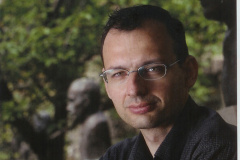Featured Lendület Member: Ildikó Király
In our conversations, we often recall memories which did not really happen, but are just a figment of our imagination, yet tell them enthusiastically, with full feeling, to our interlocutors. They are not lies, because we believe that they really happened to us. Ildikó Király, professor, Head of the Department of Cognitive Psychology at ELTE and Head of the Lendület MTA-ELTE Research Group on Social Minds, and her colleagues will be researching the formation, functioning and adaptive role of these memories in the coming years. These constructed memories seem to play an important role in our social relationships.
Under the Momentum (Lendület) research grant, which started in September 2023, researchers from the ELTE Institute of Psychology are investigating a question that is relevant to all and is present in everyday life. “This is both the beauty and the difficulty of the topic,” says Ildikó Király, head of the research group. The main question of the research is
why does it happen in everyday life that we believe that images and memories happened to us in reality, which we later find out we did not experience at all.
We try to persuade others of these memories and use them to add colour to the conversation, but however much we believe and feel that they are true, they are actually based on false information.
 Ildikó Király
Ildikó Király“This is a very common phenomenon, and it reminds us that although these experiences are everyone’s own and everyone trusts them, they may not be real,” says the psychologist. “When we ask someone to recall an interesting incident that happened to them, they are likely to be enthusiastic about telling us something, and to relive the experience of that memory, and thus to believe what they are saying. However, scientific psychological research has shown that, despite the experiential component, this information is very often wrong, 60-70% of the time. Sometimes we ourselves are confronted with these errors.”
The aim of the Momentum research is to explore the causes of this phenomenon. What are the adaptive benefits of this behaviour, why do we value these memories so much, why do we use them so often? And how do we explain to ourselves why we sometimes get our memories wrong?
The false memories that are recalled are often based on reality, just embellished by people, but are often complete falsehoods. Scientific psychology has proven that even adults need to make only a small effort to create such memories and believe that they really happened. Research to date has focused on the robustness of this effect, which is not just about making events more interesting, but also about implanting entirely new content into our memories. Momentum research will go further in showing that original memories can be recovered and separated from false memories. But it is not all the same how we try to achieve this.
They will examine whether there is any benefit at all in believing in the reality of memories in everyday life. “We have found that in most research situations there is no weight given to whether people can distinguish between events that really happened and false memories,” continues Király. “We use these memories when we want to convince someone of something and we want to back up our arguments with credible information. But they are also useful when we want to present our lives to the person we are talking to, so that they can understand how we work. We may want to reinforce our social relationships by showing that we are reliable, cooperative partners.”
In these cases, these authentic memories based on (apparently) real events are very useful. To produce them, we can combine several actual memories or use our knowledge to express what the other person expects from us. In other words, we project snapshots of ourselves onto them, from which the other person can predict our future behaviour. For this purpose, it is not important to refer back to specific content that actually happened in our memory, but what is important is that the information provided has a value based on probability. So there are situations where false memory is more useful than the original memory because it carries more information.
To find out whether people can recall real events when necessary, researchers need to use a new test method in which solving an experimental problem requires the subject to recall a specific event. The psychologists aim to demonstrate that people sort through their many similar memories based on how certain they are that the event happened to them, and use this to solve the problem. A good example of this kind of problem is when, on leaving the shopping centre, you can't remember where you parked your car. Because we have been there many times, we have parked in many places in the past, but we have to pick out the last of these memories (while relying heavily on our knowledge, as we usually park in the same part of the car park every time). But in the same way, we pick out the real events from our memories when we are looking for our key.
“Our aim is to show that our memory is both impressionable and accurate,” says Király. “In everyday life, these two aspects are present together in our memories, and we switch between them according to the purpose for which we want to use the memory.
For problem-solving, we use actual events and how certain we are about them as a selection criterion, but for social purposes we use the influenced way of remembering.”
This phenomenon is often of great practical importance, since in most situations we treat people as reliable agents. In democratic legal systems, testimonies are the strongest evidence in legal proceedings. Yet memory can be influenced, since trials are social situations in which one’s mind automatically switches to memory with predictive value. In other words, it accepts suggestions, and thus testimonies are often unreliable. The research team’s planned studies aim precisely to find ways to eliminate the influenceability of memory.
Researchers will investigate in children entering the age of recall how conversations and other social recall techniques influence memory and make them open to using the information in questions, and what control mechanisms they have to counteract this effect. For adults, simply making them aware of the fragility of their memory is enough to review their own memory and recognise the influence. It is also helpful to warn them that the interviewer does not know everything, so the information in the questions cannot be taken as fact. If adults are not informed of this, they too can easily fall into the trap of automatically using all the information they are given.
The members of the Momentum research team will investigate how this phenomenon works in children, whether they are susceptible to influence or whether they use other tools. They will set up playful experimental situations for children aged 3-6 in a museum environment and will investigate how they spontaneously remember and how much they can be influenced. In the museum, they can control the interesting experiences they have and thus find out what background factors influence the reliability of children’s memory, for example, the style of the questioner, the way he or she talks, and the amount of information given. In another study, they will investigate the use of memory in problem solving, where they will be asked to distinguish a specific individual memory from other similar memories. In parallel, adult studies will be carried out to see whether adults use the same cognitive process to solve tasks as children.
These experiments will also be complemented by neuroscience studies to reveal the neural mechanisms at work when we need to retrieve specific moments from our memories.
This requires the ability to remember and compare several things at once. Through this, they want to demonstrate that the ability to influence memory and recall accurate events depends on the challenges of the situation.




